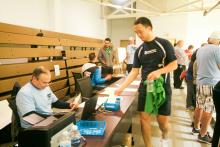For years, I have been trying to convince my students to avoid sitting. Sitting too much before, during, and after training and tournaments will kill your body. Think about it...
1. Players often is for 3-4 hours driving to a tournament
2. Players immediately sit down between matches for extended periods of time
3. As soon as the tournament is finished, players immediately sit back in the car and drive another 3-4 hours
4. Players wake up the next day and rest by sitting for 10 hours in front of the TV
5. Players wake up the next day and sit for 8 hours at a computer at work
6. Players then try to go to the club at night and wonder why they feel STIFF?? Hmmmm????
What are the risks of sitting too much?
Answers from James A. Levine, M.D., Ph.D.
Research has linked sitting for long periods of time with a number of health concerns, including obesity and metabolic syndrome — a cluster of conditions that includes increased blood pressure, high blood sugar, excess body fat around the waist and abnormal cholesterol levels. Too much sitting also seems to increase the risk of death from cardiovascular disease and cancer.
One study compared adults who spent less than two hours a day in front of the TV or other screen-based entertainment with those who logged more than four hours a day of recreational screen time. Those with greater screen time had:
- A nearly 50 percent increased risk of death from any cause
- About a 125 percent increased risk of events associated with cardiovascular disease, such as chest pain (angina) or heart attack
The increased risk was separate from other traditional risk factors for cardiovascular disease, such as smoking or high blood pressure.
Sitting in front of the TV isn't the only concern. Any extended sitting — such as behind a desk at work or behind the wheel — can be harmful. What's more, spending a few hours a week at the gym or otherwise engaged in moderate or vigorous activity doesn't seem to significantly offset the risk.
The solution seems to be less sitting and more moving overall. You might start by simply standing rather than sitting whenever you have the chance or think about ways to walk while you work. For example:
- Stand while talking on the phone or eating lunch.
- If you work at a desk for long periods of time, try a standing desk — or improvise with a high table or counter.
- Walk laps with your colleagues rather than gathering in a conference room for meetings.
- Position your work surface above a treadmill — with a computer screen and keyboard on a stand or a specialized treadmill-ready vertical desk — so that you can be in motion throughout the day.
The impact of movement — even leisurely movement — can be profound. For starters, you'll burn more calories. This might lead to weight loss and increased energy. Even better, the muscle activity needed for standing and other movement seems to trigger important processes related to the breakdown of fats and sugars within the body. When you sit, these processes stall — and your health risks increase. When you're standing or actively moving, you kick the processes back into action.
With
James A. Levine, M.D., Ph.D.




